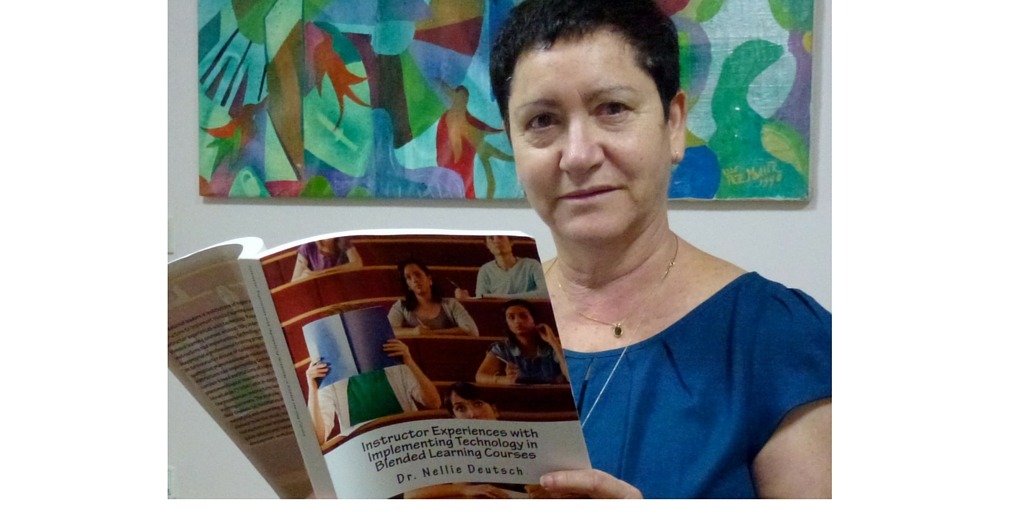Phil Wade Interviews: Dr. Nellie Deutsch
Nellie Deutsch (Ed.D) combines teaching as a way to learn, education technology, and mindfulness. She’s internationally known as a relationship-based coach, mentor, consultant, researcher, author, speaker, community builder, expert in educational technology for fully online and blended learning programs using Moodle, WizIQ, Google drive and active learning presentation tools that focus on teaching as a way to learn.
Her speaking engagements include technology for instruction and learning, collaborative learning, mindfulness, self-compassion, and authenticity. She organizes MOOCs, free online conferences, webinars, and courses for educators worldwide. She’s been teaching English as a foreign language in high school and higher education for 35 years. She is faculty at Atlantic University Masters of Arts in transpersonal leadership studies fully online .
Nellie is truly passionate about teaching, technology and teaching teachers to use technology better. For those of you who have not attended one of her free courses, seen her speak at a conference or read some of her work, I really hope this interview does her justice. If you already appreciate Nellie Deutsch then I’m sure you’ll like her even more after reading this. Enjoy!
You are a keen supporter of WIZIQ, the online platform, how would you convince a technophobe to try it for online teaching?
I’ve been teaching EFL in high schools and higher education for over 35 years. I started using the computer as an electric typewriter in 1984 and the computer lab with my high school students on a regular basis in 1992.
WizIQ came into my life after I had experienced other tools such as Moodle. In fact, I am an even keener supporter of Moodle course and learning management system than of WizIQ. I’ve been using Moodle since 2003. My use of technology came with a need to connect my students with other students from around the world so they can practice reading, listening, speaking, and writing.
I started collaborating with high school teachers and their students from North America and Europe in 2004. Our students learned each other’s literature together via Moodle. It was wonderful to co-teach.
The students and teachers connected for the live online sessions via virtual classes such as Elluminate, Interwise, Adobe Connect, and later on WizIQ. I started using WizIQ in 2007 because it was free for teachers and I could integrate it into Moodle courses. In 2009, I started collaborating with teachers and their students from high school and colleges around the globe in a project called the International Writing Exchange (IWE) using Moodle. IWE is still very popular on one of my Moodle sites called Integrating Technology.
I experimented with other platforms. I used Ning, blogs, wikis, and Wikieducator from 2007 to 2009. In 2008, I began creating Facebook groups to communicate with my students and invited teachers from around the world. Students were on Facebook anyhow, so it made sense to use it as a tool of communication.
Many English language teachers realize the importance of connecting their students with other native and non-native speakers of English from around the globe. The Internet is making the connections possible. I currently mentor teachers on how to use Moodle so their students can practice teaching as a way to learn. Students learn to present information via tools such as PowerPoint presentations using Movenote (also on their mobile phones), PresentMe, and Slidespeech. Students also learn to present using audio on screencast-o-matic.com
I’ve been doing my best to immerse my high school and higher education EFL students in authentic language for over 35 years. Teaching online allows me to engage students in accessing and presenting information in English.
The impression I get from the online ELT community is that almost every teacher is tech savvy and exploiting edtech in their teaching but, in my own experience of working in France and China, that isn’t always the truth. How do you account for this difference?
I faced many challenges along the way from my colleagues, parents, and students. In 1992, some students complained that the screen was hurting their eyes. Others loved the experience and spread the word to their peers. Teachers complained that I was making them look bad because their students wanted to take my classes because it was fun. Parents complained that I was wasting time in the computer lab. Their kids were not supposed to have fun. The Internet was viewed in those days as a form of entertainment unsuitable for learning a language.
To this day, I’m the only English teacher in my school who uses the computer lab or cell phones in the classroom. Teachers claim that they need to cover material and teach to the test. There is no time to waste. Technology is viewed by my colleagues as a waste of time.
You are extremely respected for your free online teacher training, such as for Moodle but what drives you to do all this for free?
I identify with my colleagues. I also offered to give free teacher training courses on how to use Moodle and other technologies in my neck of the woods, but teachers refused. Online, I can find teachers who are eager to learn. I enjoy being in the company of teachers who are passionate about learning with technology. Teaching others allows me to learn how to cater better to their needs.
I would like to see teachers making money online using Moodle, WizIQ, and other technologies. I have become cynical about traditional schools. Many public and private schools are abusing teachers. It hurts me to see how teachers are treated. My goal is to help teachers gain confidence and become independent of the schools, so they can earn more.
In all your experience of working with teachers, what do you believe are the keys to creating effective practitioners and developing them?
From observing and listening to teachers and students, I believe that passion for learning and love for people are key. I believe connecting with students and building trusting relationships are essential to becoming effective practitioners.
If I could give you unlimited funds to set up a school, what kind would you build, what would you teach, and why?
I would build a ground school that would engage students in lifelong learning and subjects that involved learning about the self and how to survive as an individual and social being. I would offer subjects that relate to healthy living using mobile phones and personal devices. I would provide the tools and teach students how to access and use information to solve/resolve problems, conduct research, and learn how to present information by teaching each other, the teachers or instructors, and local and global communities.





